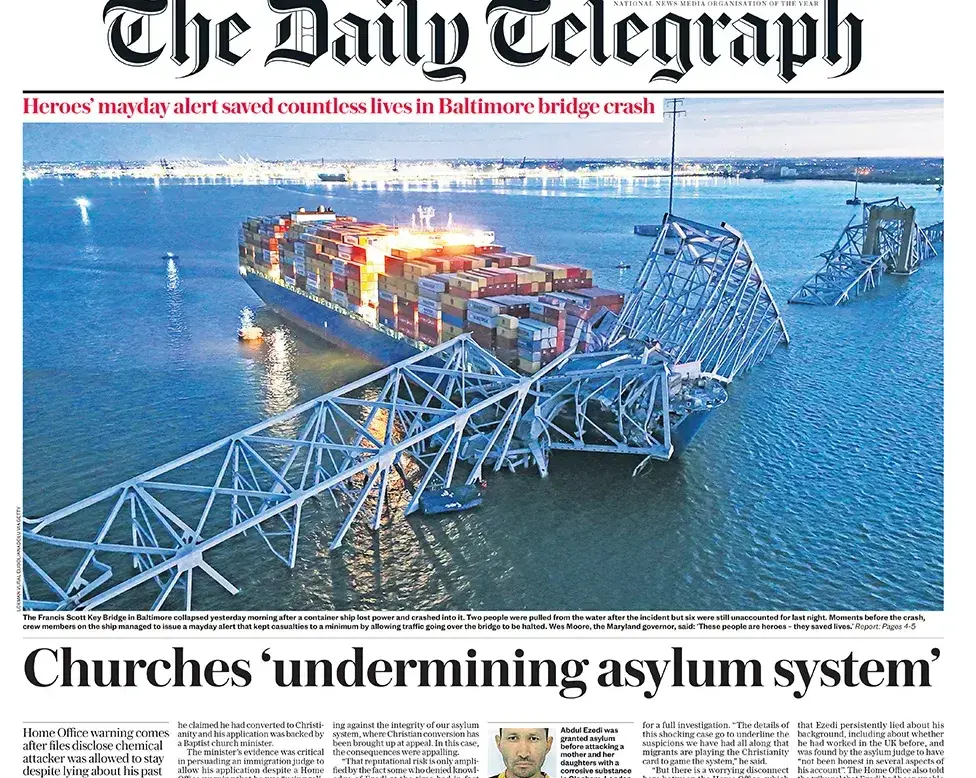
A ban on foreign powers owning UK newspapers and magazines, prompted by concern over the gulf state-backed takeover of the Telegraph, may be extended to online news websites, the Government has said.
Media minister Lord Parkinson of Whitley Bay told Parliament expanding the ban, covering direct foreign state investment of any size, would be consulted on to reflect the modern news industry and safeguard press freedom.
The Tory frontbencher also said there would be an exemption for indirect or “passive” investment by foreign states, such as sovereign wealth and pension funds, capped at 5%.
Lord Parkinson made his comments as he brought forward the promised changes to the Digital Markets, Competition and Consumers Bill that would block the ownership of British newspapers and news magazines by foreign governments.
It follows anxiety about the proposed takeover of Telegraph Media Group and The Spectator by Redbird IMI, an investment fund majority-owned by Sheikh Mansour bin Zayed Al Nahyan, vice president of the United Arab Emirates and owner of Manchester City Football Club.
Direct foreign state investment in newspapers of any size to be banned
Speaking at the Bill’s third reading on Tuesday, Lord Parkinson said: “We have heard the strength of concerns expressed in Parliament about foreign state ownership of UK newspaper and news magazines.
“The Government agrees that the importance of these publications to our democracy cannot be overstated.”
He added: “The Government is therefore taking steps to preserve the freedom of the press, recognising the risks that foreign state ownership of or control or influence over the UK’s newspapers and news magazines could pose to democracy and to free speech.
“Foreign state ownership if used to develop or control narratives which align with another state’s interests may over time corrode trust in our media as a whole.
“That is why many countries already have rules limiting foreign state ownership and that is why we are creating a new regime which will prevent foreign states from having any stake in a UK newspaper or news magazine.”
Lord Parkinson told peers: “Direct investment in newspapers of any size will be banned in future under this new regime.
“It is, however, essential that these new measures do not have undesired effects on wider business investment in the UK media.
“We will therefore introduce an exemption for investments where the stake is below 5% of the total investment being made.
“This would apply to passive investments by established and pre-existing sovereign wealth funds, pension funds or similar.”
It is planned to introduce the threshold by regulation, which would have to be approved by both Houses of Parliament.
The minister said: “Our focus here is not on foreign investment in the UK media sector in general but is targeted specifically at foreign state investment in newspapers and news magazines.
“We are targeting foreign state investment in a narrow but important part of the UK market in order to safeguard the health of our democracy.”
He added: “In tandem, I can confirm that we will be consulting on expanding the media mergers and the new media foreign state ownership regime to apply to online news websites.
“This will bring the regimes up to date in order to reflect modern news consumption habits and better to protect the freedom of our media.”
‘Ensuring principle of press freedom is not up for sale’
Tory former Lords leader Baroness Stowell of Beeston, who had led calls for a ban on foreign state media ownership, said: “All that Parliament is doing by these changes is ensuring that our fundamental principle of press freedom is not up for sale.”
In the wake of accusations that China was behind “malicious” cyber attacks on parliamentarians and the Electoral Commission, Conservative former Cabinet minister Lord Forsyth of Drumlean said it was “inconceivable” Beijing should “own 1% or even one share in a British newspaper”.
He said: “I very much look forward to this legislation receiving royal assent which will mean there is a complete ban on any foreign government either having ownership or influence over our press which must be right in a free and democratic society.”
Non-affiliated peer Lord Faulks, who chairs press regulator IPSO, said: “Freedom from state interference is of course of fundamental importance. Our newspaper industry is not in anything like the health state it once was and its vulnerability is what makes newspapers potentially prey to outside investment from foreign states who seek influence.
“But important though it is to keep our newspapers free from such influence we do want them to survive and indeed to prosper and I hope that the amendment entirely comprehends that aim.”
Spectator editor Fraser Nelson praised Parliament for protecting press freedom with the changes and predicted a “swift retreat” from the UAE and a resumption of the sales process for his title and Telegraph Media Group.
He wrote: “The free press is not just a business: it is part of any country’s democratic apparatus. And in an era of acquisitive autocracies trying to buy soft power, this now needs to be protected. If the government is so anxious for Emirati investment that it can’t or won’t act, then parliament can. The Lords, so often written off as a sleepy second chamber, turned out to be the arena where the action took place.”
The Bill will now return to the Commons for MPs to consider the changes made.
Email pged@pressgazette.co.uk to point out mistakes, provide story tips or send in a letter for publication on our "Letters Page" blog
